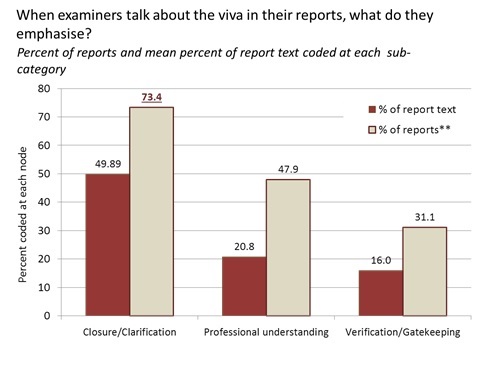
Cross National Viva Study
A cross-national study of the relative impact of an oral component on PhD examination quality, language and practice
ARC Discovery Project (DP110103007)
Professor Allyson Holbrook
Professor
School of Education
- Allyson.Holbrook@newcastle.edu.au
- (02) 4921 5945

Sid Bourke
Emeritus Professor Terry Lovat
Emeritus Professor
College of Human and Social Futures
- Terry.Lovat@newcastle.edu.au
- (02) 4921 6288
Aims and Significance
This study extends the team's previous research on PhD thesis examination, standards, examiner judgement and processes, into analysis of different models of examination, specifically models with and without a viva voce or oral examination. The main aims were to determine what the viva contributes to assessment and the effectiveness of the different models. The study provides a significant advance by presenting the first sustained comparison of the two models and is the first international comparative analysis of examiner report text, examiner recommendations and emphases. The intent is to inform debate and policy in Australia - one of few countries with a non-viva model
Summary of Results
Examiner data was collected from five institutions in two countries who, as a general rule, conduct an oral as part of the PhD examination process – the oral model. From a previous PhD study, we have examiner data from eight Australian institutions – the non-oral model. Over 80 interviews with experienced examiners were conducted in the three countries covering examiners with experience of the oral model only, the non-oral model only, and those with experience of both models.
While differences in emphases were found, overall the presence or absence of a viva did not seem to greatly influence what the examiners emphasise in their written reports. Report comments emphasised thesis qualities, with only half of examiner reports mentioning the viva. When mentioned, the expectations of examiners for the viva were primarily directed to the thesis and its improvement. Looking specifically at the text pertaining to the viva, half was concerned with clarification and closure issues. (see figure below). This is in contrast to the literature, the aims of the viva as expressed by each institution, and in examiner interviews. In the latter, while defence of the thesis and assessing knowledge and understanding were foremost, establishing authenticity; providing a finishing point; demonstrating mastery; intellectual exchange; and developing the researcher featured prominently. Further, the interviews specified purposes of the viva (e.g. a ritual and celebratory function) that are not assessment related.

Changing examiner recommendation as a result of the viva was the exception rather than the norm. The viva served more to fine tune comments and offer evidence for the original recommendation than to effect change.
We conclude that inclusion of a viva would not make a difference to the Australian PhD examination results. What it could do is could offer greater closure for the student and opportunity for collegial exchange.
See Publications- Research into PhD Examination for research outputs of this project
The University of Newcastle acknowledges the traditional custodians of the lands within our footprint areas: Awabakal, Darkinjung, Biripai, Worimi, Wonnarua, and Eora Nations. We also pay respect to the wisdom of our Elders past and present.






